Words of Wisdom - Shastra
& Shastrakaras speak
For Books and shastra downloads see Main Index, under
Books:
Om Namo Bhagavate Vasudevaya
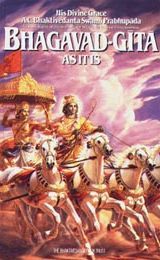

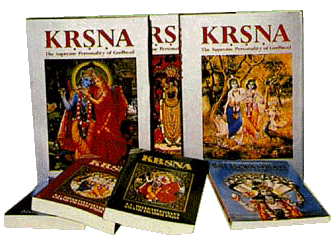
The Complete Works of Srila Prabhupada
All the books, the letters and conversations at your
fingertips
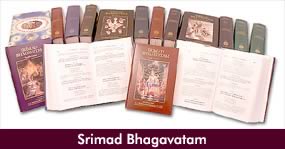
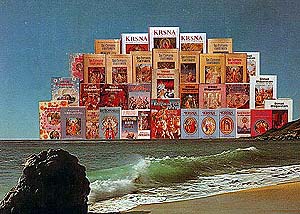
All Srila Prabhupada's books and more on one disk
http://www.vedabase.com




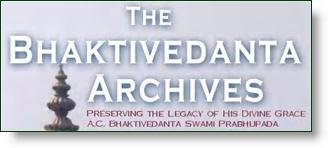
Srila Prabhupada's Audio lectures to listen to on-line:
http://www.hare-krishna.org/srila-prabhupada-lectures.htm
Listen to Srila A.C. Bhaktivedanta Swami Prabhupada on-line
- all 900 of his lectures are available HERE:
http://www.prabhupadavani.org/
Srimad Bhagavatam - the entire lecture series listen and
read along on-line - Narrated by Amala Bhakta dasa:
http://www.prabhupadavani.org/SB_index.html
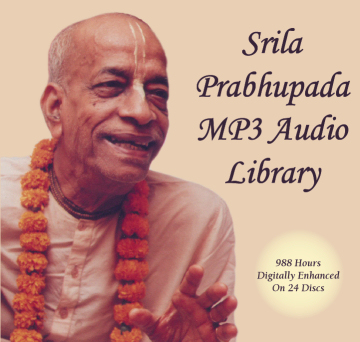
The new enhanced Prabhupada MP3 series
http://www.prabhupada.com/store/store.php?page=product.php&id=MP3AUDIOLIB

The Audio Srila Prabhupada Lilamrita
Please find enclosed details a being launched on Gaura Purnima day 2008.
It is a simple audio rendition of sections from "Prabhupada,
your ever well-wisher" by Satsvarupa dasa Goswami.
It was recorded here in the UK back in the mid '90's
by Bhagavat-Asraya prabhu (ACBSP) at my studio and I edited it into 8 short
instalments for inclusion on my weekly radio programme "Nectar of Devotion".
We had such a good response from listeners that it was
decided to add "The Audio Srila Prabhupada Lilamrita" to the Nectar of
Devotion website archive page.
In doing so I felt it might be nice to create a very simple,
seperate website for the Lilamrita.
The result is http://www.lilamrita.page.tl
It will be officially launched on Gaura Purnima day 2008
for the pleasure of Srila Prabhupada and all the Vaishnava's.
I hope this humble attempt will add to the growing appreciation
of Srila Prabhupada's remarkable achievements.
If other Krishna conscious radio stations would like
to broadcast this Lilamrita series they can contact me at devotion@nusoundradio.com
and I can send them mp3 copies.

Srila Prabhupada Vyasa-puja book 2007
http://www.krishna.com/node/1048
Vyasa-puja is an annual celebration by the devotees of Lord Krishna
to offer homage to their guru, or spiritual teacher.
There are two versions of the Vyasa Puja Book based on the speed of
your internet connection.
If you are unable to open the file, download Acrobat Reader.
High speed connections, with pictures.
Vyasa-puja
Book 2007 [PDF/ZIP, 2.11MB]
Low speed connections, no pictures.
Vyasa-puja
Book 2007 (no pictures) [PDF/ZIP, 2.11MB]








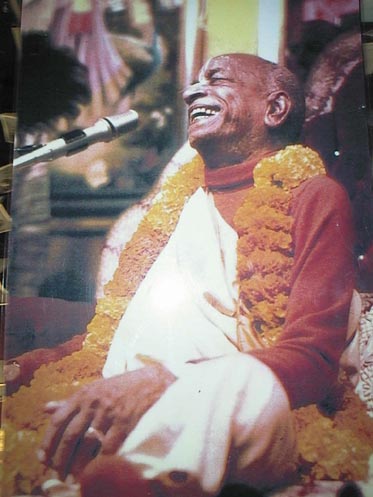
Visit "Prabhupada Connect" for all manner of Prabhupad
Nectar:
http://www.prabhupadaconnect.com/Index.html
Srila Prabhupada's Final Lesson Video - Downloadable and
viewing on-line
http://users.iskconludhiana.com/images/thumbnails.php?album=21
All pictures of Srila Prabhupad (19, 494)
http://www.iskconmedia.com/photos/Prabhupada_All_Photos/


All Srila Prabhupada's original books
available for sale here.

Download all the Hare Krsna teachings which includes
all Vaisnava and
Vedic concepts by visiting one of the sites listed at
the following address.
http://www.geocities.com/suci123/bookdownloadsites1.html
The Bhaktivedanta Book Trust
Srila Prabhupad Memorial Library
http://www.krishna.com/main.php?id=33


33 Books Online Including Srimad Bhagavatam!
http://www.geocities.com/freeprabhupadabooks
The compressed "self extracting" file mentioned is now currently
available for download
http://www.krsnaconsciousness.org/Gauranga/Folio/BhaktivedantaVedabase_DOS.exe

Download or Listen to Prabhupad Bhajans HERE:
http://www.prabhupadavani.org/web/text/Bhajans.html


On-line 1972 McMillan edition - Bhagavad Gita As It Is:
http://www.asitis.com/

Bhagavad Gita AS IT IS on-line through the Tirupathi
Balaji site:
http://www.bhagavad-gita.us/

Bhagavad Gita Study guide on-line book:
http://chantandbehappy.com/gita/studyguide/StudyGuide-main.htm
Bhagavad Gita Study guides by numerous Iskcon devotees
- FREE downloads:
http://www.veda.harekrsna.cz/library/#3

All the Scriptures you'd ever need 4 FREE
http://www.hknet.org.nz/index-books.htm
http://www.hknet.org.nz/DDB.htm
http://www.hknet.org.nz/DDB2.html
last updated 4th August 2003


Srimad Bhagavad Gita AS
IT IS
Bhagavad Gita: Chapter
7 - Knowledge of the Absolute
TEXT 7
mattah parataram nanyat
kincid asti dhananjaya
mayi sarvam idam protam
sutre mani-gana iva
WORD FOR WORD
mattah--beyond Me; para-taram--superior; na--not; anyat kincit--anything
else; asti--there is; dhananjaya--O conqueror of wealth; mayi--in Me; sarvam--all
that be; idam--which we see; protam--is strung; sutre--on a thread; mani-ganah--pearls;
iva--like.
TRANSLATION
O conqueror of wealth, there is no truth superior to Me. Everything
rests upon Me, as pearls are strung on a thread.
PURPORT by HDG Srila A.C. Bhaktivedanta Swami Prabhupad:
There is a common controversy over whether the Supreme Absolute Truth
is personal or impersonal. As far as Bhagavad-gita is concerned, the Absolute
Truth is the Personality of Godhead, Sri Krsna, and this is confirmed in
every step. In this verse, in particular, it is stressed that the Absolute
Truth is a person. That the Personality of Godhead is the Supreme Absolute
Truth is also the affirmation of the Brahma-samhita: isvarah paramah krsnah
sac-cid-ananda-vigrahah; that is, the Supreme Absolute Truth Personality
of Godhead is Lord Krsna, who is the primeval Lord, the reservoir of all
pleasure, Govinda, and the eternal form of complete bliss and knowledge.
These authorities leave no doubt that the Absolute Truth is the Supreme
Person, the cause of all causes. The impersonalist, however, argues on
the strength of the Vedic version given in the Svetasvatara Upanisad (3.10):
tato yad uttarataram tad arupam anamayam/ ya etad vidur amrtas te bhavanti
athetare duhkham evapiyanti. =ECIn the material world Brahma, the primeval
living entity within the universe, is understood to be the supreme amongst
the demigods, human beings and lower animals. But beyond Brahma there is
the Transcendence, who has no material form and is free from all material
contaminations. Anyone who can know Him also becomes transcendental, but
those who do not know Him suffer the miseries of the material world.=EE
The impersonalist puts more stress on the word arupam.
But this arupam is not impersonal. It indicates the transcendental form
of eternity, bliss and knowledge as described in the Brahma-samhita quoted
above. Other verses in the Svetasvatara Upanisad (3.8-9) substantiate this
as follows:
vedaham etam purusam mahantam
aditya-varnam tamasah parastat
tam eva vidvan ati mrtyum eti
nanyah pantha vidyate 'yanaya
yasmat param naparam asti kincid
yasman naniyo no jyayo 'sti kincit
vrksa iva stabdho divi tisthaty ekas
tenedam purnam purusena sarvam
"I know that Supreme Personality of Godhead who is transcendental
to all material conceptions of darkness. Only he who knows Him can transcend
the bonds of birth and death. There is no way for liberation other than
this knowledge of that Supreme Person."
"There is no truth superior to that Supreme Person, because
He is the supermost. He is smaller than the smallest, and He is greater
than the greatest. He is situated as a silent tree, and He illumines the
transcendental sky, and as a tree spreads its roots, He spreads His extensive
energies."
From these verses one concludes that the Supreme Absolute
Truth is the Supreme Personality of Godhead, who is all-pervading by His
multi-energies, both material and spiritual.
- His Divine Grace A.C. Bhaktivedanta Swami Prabhupada
Copyright 1983 The Bhaktivedanta Book Trust International. Used with
permission.

Bhagavad Gita As It Is - http://www.asitis.com/
Bhaktivedanta Vedabase - Bhagavad Gita on-line http://bhagavadgitaasitis.com/
Bhaktivedanta VedaBase: Bhagavad-gita As It Is http://vedabase.net/bg/en
Bhagavad Gita Multi Media Web-version http://chantandbehappy.com/gita/
Listen to Bhagavad Gita on line - http://www.Gitamrta.org
View our Bhagavad Gita Overview:
http://www.hknet.org.nz/BG.html
Archive: http://www.cs.rice.edu/~vivek/btg/archive/
Home Page: http://www.cs.rice.edu/~vivek/btg/
Join Bhagavad Gita eGroups HERE
mailto:bhagavad_gita-owner@egroups.com


Prabhupada Uvacha:
(here's some nectar, sometimes it comes in the form of Srutakirti prabhu's
diary, other times from Govinda dasi's diary, Hari Sauri prabhu's Transcendental
Diary, Bhurijan prabhu's book, or sometimes from a letter, or other related
source, but still nectar...)
Higher Realizations
Some devotees become very excited about sadhus
with "higher realizations," who regularly speak about confidential Vrndavana
lilas in an intimate, attractive manner. Such devotees seem to think that
Srila Prabhupada had a "lower realization" because he almost always spoke
the simple, basic philosophy of Krsna consciousness and was most cautious
about speaking of esoteric subjects. However, simply speaking about "high
topics" does not constitute the highest realization. The highest realization
is to sacrifice everything to serve Krsna as He wants. Krsna wants prthivite
ache yata nagaradi grama sarvatra pracara haibe mora nama -- preaching
in every town and village.
Srila Prabhupada was always absorbed in preaching
Krsna consciousness. He generally spoke in a simple manner, at a philosophical
level accessible to all. He hardly ever discussed the subtleties of rasa-tattva
or other intimate topics. Some people have concluded, therefore, that Srila
Prabhupada is a lesser guru who teaches only on a lower level. Maybe they
have not heard that even higher than madhurya (the sweet exchange of Krsna
and the gopis in Vrndavana) is audarya (the mood of liberal distribution
of Krsna bhakti exhibited by Lord Caitanya). Even if we consider madhurya-rasa,
what is the essence of madhurya? Sacrificing everything for Krsna, just
as the gopis did. No one of his generation sacrificed even a millionth
of what Prabhupada did.
Others may speak of prema, but Srila Prabhupada
practically demonstrated his prema by going all over the world, preaching
and convincing the atheists and demons, or at least taking them on. Others
may talk, but they have no potency to convince atheists and indeed, have
no taste for such activities. They are on such a "high" level, they could
hardly condescend to come down among nondevotees. They may attract many
followers, but only those who have already been made devotees. In this
way they collect around them groups of sentimental sycophants who discuss
the teachings of the previous acaryas, as if to evince themselves as very
learned and qualified. But in the opinion of our previous acarya, Srila
Bhaktivinoda Thakura, the position of a Vaisnava can be tested by seeing
how good a touchstone he is -- that is, by seeing how many Vaisnavas he
has made during his life. This is the highest realization and Srila Prabhupada
had it. There is no one in this world more dear to Krsna, nor will there
ever be one more dear.
- From the "My Memories of Srila Prabhupada" by
HH Bhakti Vikas Swami
To receive little snippets of nectar like this on a daily basis subscribe
HERE: or If you want to introduce anyone else in reading Srila Prabhupada
Nectars, please send their eMail addresses to mailto:krpamaya_gauranga@hotmail.com
Please Chant:
 Hare
Krishna Hare Krishna Krishna Krishna Hare Hare
Hare
Krishna Hare Krishna Krishna Krishna Hare Hare
 Hare
Rama Hare Rama Rama Rama Hare Hare
Hare
Rama Hare Rama Rama Rama Hare Hare
...................and be Happy

Listen to Srila Prabhupad on-line
....a different lecture, morning walk, conversation or
class daily.
"The Natural World -- Unnatural"
Srimad-Bhagavatam 5.5.1
Johannesburg, October 20, 1975
Listen to the entire lecture on-line:
http://prabhupadaradio.com/M3U/Bhagavatam/m3u_II/SB416.m3u
Prabhupada:
sri-rsabha uvaca
nayam deho deha-bhajam nrloke
kastan kaman arhate vid-bhujam ye
tapo divyam putraka yena sattvam
suddhyed yasmad brahma-saukhyam tv anantam
[SB 5.5.1]
This is a verse, verse number one, Fifth Canto, Fifth
Chapter, of Srimad-Bhagavatam. We are publishing Srimad-Bhagavatam, twelve
cantos in sixty volumes, and this is the latest volume, just received today.
Therefore I am taking advantage of this volume and reciting one verse.
This is in connection with Rsabhadeva's instruction to His sons. Rsabhadeva
was a king, and He had one hundred sons. Of all of them, the eldest was
Maharaja Bharata, under whose name India is called Bharatavarsa since the
time of Maharaja Bharata. So the instruction was being discussed amongst
the royal family members. Formerly all Vedic instructions were discussed
amongst the very topmost class of men. Yad yad acarati sresthas lokas tad
anuvartate [Bg. 3.21]. That is the instruction in the Bhagavad-gita. If
the higher level class of men accepts something as truth, then the ordinary,
common man follows that.
So the problem of life is discussed here by Rsabhadeva.
He says, "My dear boys," nayam deha deha-bhajam nrloke kastan kaman arhate
vid-bhujam ye [SB 5.5.1]. Ayam. Ayam means "this," this body, this human
form of body. It is also a body, and the dog's body is also a body, material
body. It is also made of blood and bone and urine and stool and so many
other things. The dog's body is also made the same ingredients. But what
is the difference between dog's body and this human body? He advises, ayam
deha: "This human form of body..." Deha-bhajam nrloke. And where this body
is obtained? It is obtained in the human society. This intelligent brain
and good form of body, it is to be found in the human society. In the human
society you will find from this body, big, big professors, big, big philosophers,
scientists, mathematicians and..., they are coming, not from the dog society.
That is not possible. Therefore it should be properly utilized. Nayam deho
deha-bhajam nrloke. Nrloke means in human society. So how it should be
utilized? He says, kastan kaman arhate, arhate vid-bhujam ye. Kastan. Kastan
means very, very hard labor, kastan. And kaman means necessities of life
we require. The necessities of this body, that is required. We want to
eat something, we must have a shelter to live, Bhagavata.-bhaya, and we
must defend from the enemies or from the attack of other living beings.
Kastan kaman. So we require all these things, but not very hard labor,
working day and night. That is for the lower animal. Kastan kaman na arhate
vid bhujam ye. As the animal is working very hard day and night for meeting
their necessities of life, the human form of life is not meant for that
purpose. This is the basic principle of instruction. Ayam deha. This deha,
this body, is meant for higher purposes, not for simply meeting the necessities
of life. This is the basic principle of instruction. They have no other
way. The cats and dogs and hogs, they are working day and night where to
find out some stool and eat it, and as soon as the body is filled, then
sense gratification, sex life This is going on in the lower class of animal
life.
So does it mean that human life also will be utilized
only for this purpose? No. That is his advice. "This is not meant for wasting
our time and living like the lower animals, cats and dogs and hogs." Then
what it is meant for? He says, tapo divyam: [SB 5.5.1] "My dear sons, this
body is meant for tapo, austerity." Austerity. What is that austerity?
Divyam, to realize God. That is the whole Vedic principle, that human body,
human society should be trained intelligently in such a way that he can
understand God. This is the goal of life. In the Vedanta-sutra... Those
who are philosophically advanced, they might have studied the Vedanta-sutra
or Brahma-sutra. So the first aphorism of the Brahma-sutra is athato brahma
jijnasa: "Now this human form of life is there..." We have got it by the
material nature's grace. There are 8,400,000 different forms of life, transmigration
or evolution, as you say.
jalaja nava-laksani
sthavara laksa-vimsati
krmayo rudra-sankhyakah
paksinam dasa-laksanam
In this way there are aquatics, 900,000 different forms
of life. And then, from aquatics to plants and trees, two million forms.
Then insects, different insects, eleven..., 1,100,00. Then birds, ten...,
one million different forms. Then beasts, three million different forms.
In this way there are eight hundred millions. Hm? Eight?
Pusta-krsna: 8,400,000.
Prabhupada: Eight millions. And human being, 400,000 species
form, there are. So out of that, the civilized man, the best form of human
body, that is meant for this purpose, tapo divyam putraka yena suddhyed
sattvam [SB 5.5.1], that: "My dear boys, you should not waste your time
simply for finding out the necessities of this body and work very hard
day and night and forget your own business." What is that own business?
Self-realization, "What I am." This is called own business. "Am I this
body or something else?" We can understand it that "I am not this body,"
because as soon as I, you, leave this body, the spirit soul, it is nothing
but lump of matter. That we can understand. That is the beginning of Bhagavad-gita
lesson, to understand that "I am not this body." If we live under the conception
that "I am this body," then, the sastra, Vedic literatures, condemns, "Then
you are no better than the cats and dogs, because they also live under
the bodily concept of life." And if you do not understand that you are
not this body, you are spirit soul and you are changing different forms
of body for realization of the higher, the highest goal of life... That
you should understand. That is called tapasya.
So if we do not become very sober... Tapo divyam [SB 5.5.1].
Then, to become sober, dhira... Dhiras tatra na muhyati [Bg. 2.13]. Dhira
means sober. If we remain restless like animals, then we cannot achieve
the goal of our life. We do not know how the laws of nature is working.
We can experience how the laws of nature is working in our present life.
Present life... Just like a young man, if he thinks that "I shall not become
old man. I shall remain young man," will the nature's law allow it? No.
You must become old man. There is no question of saying that "I don't want
to become old man." So, no, nature's law will not allow you. You must become
old man and suffer the old age's disadvantages. That you must. Similarly,
if the old man says, "Never mind. I have become old man. I will not die,"
no. Nature's law will not allow. He must die. Similarly, after death, if
you think foolishly that there is no more life, that is also wrong. Nature's
law is that you must accept another body. This is nature's law. So we are
dependent on nature's law. However foolishly we declare that "We are independent.
We don't care for anything," that will not stay. We are under the clutches
of material nature's law. In this law, by evolutionary process we have
come to this human form of life, and if we don't utilize it properly, then
we are missing the chance.
So our Krsna consciousness movement is reminding the whole
human society that "Don't lose this chance of getting a human body." You
must properly utilize it. And how it is to be utilized? That is stated
here by Rsabhadeva: tapo divyam putraka yena sattvam suddhyet [SB 5.5.1].
Sattvam, our existence, is now polluted. Therefore we are getting this
material body and changing this material body. And as soon as we get a
material body, then our miserable condition begins. In this material body
nobody can say that there is no miserable condition. It is full of miserable
condition. There are three kinds of miserable conditions: adhyatmika, adhibhautika,
adhidaivika. Adhyatmika means pertaining to the body and pertaining to
the mind. There are so many miseries. Otherwise... The other day Swami
Pusta-krsna was telling that in this country there is maximum number of
suicide. Is it not? So, why one commits suicide unless he feels bodily
position very uncomfortable, mental condition very disturbing? So this
is called adhyatmika, pertaining to the body and mind. There are many troubles.
Every one of us, we have got that experience, that there are troubles.
I may be very rich, I may have immense wealth, but if my body and mind
is not in order, I am in trouble. So simply material opulence, material
wealth will not satisfy us. We require bodily comforts. And if I have got
millions of dollars and if I am diseased man, I cannot enjoy; I cannot
be in happiness. So these are one type of miserable condition. Similarly,
there are other types of miserable condition as adhibhautika. I do not
wish to create any misunderstanding with a friend, but automatically there
is some misunderstanding between friends, neighbors, nation, man to man,
business friend. There are troubles. So this is called... And not only...
If not human being, human being, but other, lower animals. Just like there
are insects, there are cockroaches, there are so many other living bodies
-- they are giving us trouble. That is called adhibhautika. And adhidaivika.
Adhidaivika is nature's disturbance.
So there are three kinds of miserable condition in this
material world, and either of them or all of them, they are always troubling
us. This is our position. We have to understand that. We are suffering.
That everyone knows. But by illusion we think that "This is not suffering.
This is natural." No. It is not natural. Just like if you have got fever,
it is disease. Don't think that it is natural. Why you should be suffering
from all these troubles? That is not natural; that is unnatural. Because
we are part and parcel of God, we living entities, we should be as happy
as God is. That is our position. Sac-cid-ananda-vigrahah. God is described
isvarah paramah krsnah sac cid ananda vigrahah. Sat, cit, ananda [Bs. 5.1].
This is three different features of God's body. What is that? Sat. Sat
means eternal. Sat. And cit. Cit means knowledge, full of knowledge. And
ananda means full of bliss. That is ananda. So this is God's body. And
we are part and parcel of God. Just like gold and particle of gold. It
may be very small particle, but one shall say it is gold. It is not anything
else. Similarly, in quality we are same as God. Now we have got this body
which is not eternal. God's body is eternal and my, this body is not eternal.
And sat, cit... God is full of knowledge, omniscient, but my body is full
of ignorance. Why these universities are there? Because we do not know
what it what. Therefore we are being educated. So that means this body
is not full of knowledge. It is full of ignorance. So And again, God's
body is blissful, and our body is miserable.
So the aim should be how again we come to the original
position like God or the same type of body -- blissful, full of knowledge
and eternal. That is the aim of human life. Therefore it is said, tapo
divyam: [SB 5.5.1] "My dear son, don't become like cats and dogs and work
hard for the bodily necessities of life. This human form of life is meant
for austerity." "Why austerity? Let us enjoy." "No." Tapo divyam putraka
yena sattvam suddhyet: "If you accept the path of austerity, then your
existence will be purified." Now, at the present moment, the existence
is not purified; therefore we have to accept birth, death, old age and
disease. This is not our business. But because we have got this material
body, the nature's law forces to accept all these things -- birth, death,
old age and disease. In the Bhagavad-gita it is said, janma-mrtyu-jara-vyadhi-duhkha-dosanudarsanam
[Bg. 13.9]. We are trying to be happy fighting with unhappiness, but we
do not know our real unhappiness are that we have to die, we have to take
birth again, we have to become diseased and we have to accept old age.
Janma-mrtyu-jara-vyadhi duhkha-dosanudarsanam. This is intelligence, that
"I am trying to solve all the problems of life by advancement of civilization,
education, scientific knowledge and so many things. That's all right. But
what is the solution of my, these four principle of miserable condition:
birth, death, old age and disease?" And because we cannot make any solution,
we set aside these four problems. We go on with the temporary problems
and become busy to solve it, and in this way we waste our, this valuable
human form of life like the cats and dogs. This is the instruction.
So we should not do that. We must be sober, and we must...
And it is not very difficult. The knowledge is there in the Vedic literature.
And it is... Everyone can accept it. It is not a sectarian, so-called religious
principle. It is scientific. Every human being should understand his position.
Every human being should not waste his valuable time. So therefore Narottama
dasa Thakura, a great devotee and a great Vaisnava acarya, he has sung
a nice song, that hari hari biphale janama gonainu: "My dear Lord, I got
this chance of human form of body. Unfortunately I have wasted my time
without any self-realization." Hari hari biphale, janama gonainu. Manusya
janama paiya, radha krsna na bhajiya: "I got this very valuable form of
life, human form of life, but instead of understanding what is God, Radha-Krsna,
janiya suniya bisa khainu, "knowingly I have drunk poison." This is the
opportunity to understand God and make solution of all different types
of births and deaths and transmigration from one body to another.
And as soon as I get a material body, immediately there
are so many miserable condition. But I am... As spirit soul, part and parcel
of God, I have nothing to do with all these things, but I have been forced
to be working with these problems of life. This is human intelligence.
Therefore he requires to live a saintly life. It is not possible, of course,
that everyone should become saintly. That is not possible. Therefore in
the Vedic civilization it is prescribed, varnasrama-dharma. Varnasrama-dharma.
Varna means four classification of the society, and asrama means four division
of spiritual life. The society, it is not meant for any particular nation
or particular community. It is meant for the whole human society. Krsna
says in the Bhagavad-gita that catur-varnyam maya srstam guna-karma-vibhagasah
[Bg. 4.13]. The human society should be divided into four groups. What
is that? The first-class men. There are first-class, second-class, third-class,
fourth-class men. We have got our experience. Not that everyone is equally
intelligent. No. There is difference of classification or intelligence
or genuineness. There are so many things, division. So here also you have
got division, classification. That is natural.
So first-class, the first-class men, means they should
be trained as brahmana, at least one class of men. Catur-varnyam maya srstam
[Bg. 4.13]. In order to realize the highest goal of life there must be
division in the society and there must be division in spiritual life. The
social life is divided into brahmana, ksatriya, vaisya, sudra. Brahmana
means the most intelligent class of men, one who can understand God. That
is brahmana. Brahma janatiti brahmanah. First-class man means not first-class
dress. First-class man means he has got full knowledge: jnanam vijnanam
astikyam brahma-karma svabhava-jam [Bg. 18.42]. Full knowledge. He knows
what is God. That is first-class man. So the second-class men means the
ksatriyas, the administrators, the administrative class of men, because
government men, they must be very sober to rule over the citizens. There
are varieties of men, and, to regulate them so that the state may go on
very peacefully, so this is dependent on the ksatriyas. And they must be
prepared to fight to the enemies. Everything is described in the sastra,
in the Bhagavad-gita. Tejo sauryam yuddhe capy apalayanam. The administrator
should be so brave that whenever there is war they must first of all come
forward to fight so that soldiers and others may follow him. So they are
second-class men, and they should be instructed by the first-class men.
Then their activities will be nice.
Brahmana-ksatriya-vaisya. Vaisya means the productive
class of men. Their business is how to produce food for all the society
and give protection to the cows. Krsi-goraksya-vanijyam vaisya-karma svabhava-jam
[Bg 18.44]. There must be sufficient milk in the human society. If you
drink more milk and milk products, then your brain will be very sharp.
You will understand things very nicely, corectly. Therefore milk is very
important. In the Vedic sastra cow protection is recommended. Why? Because
milk is very, very important thing. Milk is... What about the meat-eaters?
If there are meat-eaters, they can eat other animals, but especially they
should not eat the cow. They should give them protection. So because the
vaisyas, the first class, second class, third class, they are meant for
producing food for the society... So milk is very important. Therefore
it is recommended, krsi-goraksya-vanijyam. And if there is excess, they
can trade. And this is the first class, second class, third class. And
those who cannot act as first-class men or as second-class men or third-class
men -- that means fourth-class men -- they are called laborer or worker
class of men.
So it is not that because one person is belonging to the
worker class and another person is becoming the first class, there is differentiation.
No. Everyone is important. Just like in this body the head is very important.
That is a fact. If the head is cut off, then whole body is finished. But
that does not mean that head is simply required without leg. Leg is also
required; the hand is also required; the belly is also required. Similarly,
the first-class man, the second-class man, the third-class man and the
fourth-class man, all of them are equal provided they are adjusted for
the higher aim of life, the higher aim of life -- the brain. The brain
means... First-class brain means to realize self, to understand God, and
do accordingly. This is required. This is called varnasrama-dharma. So
unless one takes to the varnasrama-dharma as they are prescribed, it is
not human society. It is cats' and dogs' society, and you cannot be happy,
however you may adjust, in a society who is filled up with cats and dogs.
That is not possible.
So this Vedic instruction, it is not meant for any particular
person, any community or any country. It is meant for everyone. So we should
take advantage. We are therefore publishing in English so many books so
that people may understand. English language is spoken practically all
over the world, and we are selling also. These books are being appreciated
by the professors in university and highly learned circles, and common
men also. So I am lecturing for, say, half an hour or forty-five minutes
-- it is not possible to explain all the Vedic intelligence -- but we are
distributing these books. I request you to read all these books as far
as possible and take advantage of do not spoil your life simply for meeting
the necessities of this body very hardly like cats and dogs. It is not
required. The real business is to realize your self." That is Tapo divyam
[SB 5.5.1]. For which And actually we do not require very much to work
for meeting the necessities of life, because from the sastras we can understand
that our necessities of life are already there. They are. Tasyaiva hetoh
prayateta kovido [SB 1.5.18]. The sastra says that "Don't bother yourself
about the necessities of life. This is already there, settled. You will
get it. Depend on the supplier of the necessities of life. The supplier
of necessities, life, is God." That is the description in the Vedic literature.
Therefore we see practically that Christians, they go to church and they
request God, "O God, father, give us our daily bread." Actually it is supplied
by Him. So there are 8,400,000 different forms of life, and God is the
creator of them, and He is supplying all the necessities of them. We human
being, we have got different enterprises, but what the enterprises have
got the elephant in Africa? There are millions of elephants. Who is feeding
them? And the ant also. There are trillions and millions of ant in your
room. Who is feeding them? So we do not believe in God. That is our defect.
Otherwise, if God is providing food for the lower animals, why not for
us if we become God conscious?
So there is no reason. We shall get. But we have been
habituated for economic development. Let us do it. It doesn't matter. But
don't forget God. That is wanted. If you forget God, then you are no better
than dog. This is the movement of Krsna consciousness movement, that we
are reminding everyone that "Don't remain like lower animals. You have
got this opportunity of human life. You go, accept little austerity." So
what we are prescribing, austerity? Just like these European, American
boys. They are under training. Our first business is to take declaration
that the devotee will not indulge in illicit sex life, not meat-eating,
no intoxication and no gambling. This is austerity. And chant Hare Krsna.
It is very easy. It is not very difficult. Just like these boys, girls,
they are chanting Hare Krsna, and they are undergoing the austerity. So
they have not died. Not they are unhealthy. You can see. They are living,
and they will live. But they have become purified. Tapo divyam yena sattvam
suddhyet [SB 5.5.1]. This is purifying our existence. Purifying existence
means no more material body. Tyaktva deham punar janma naiti mam eti kaunteya
[Bg. 4.9]. These are the information we get, that if we purify our existence,
our existential position, then the result will be that... Tyaktva deham.
We have to give up this body. The cats and dogs also will give up, and
I'll also give up. That's a fact. But the cats and dogs, they'll get another
material body, but if you purify your existential position, then tyaktva
deham punar janma naiti [Bg. 4.9], you'll not to have, accept any more
material body. You shall stay in your spiritual body. And when you stay
in your spiritual body you become equal with God -- sac-cid-ananda: eternal,
ananda, blissful, and full of knowledge. That is the human form of life...,
er, aim of human mission. Don't miss this. There is ample information.
The practice is very easy. Anyone can do it.
So our only request is take advantage of this Krsna consciousness
movement. Try to understand it properly. It is not meant for any particular
person, nation, or community. It is for every human being. So we request
you to study this movement and take to it seriously. Then you will be all
happy.
Thank you very much. Hare Krsna. [break]
Yes. Creation means this material world. There are two
worlds: material world and spiritual world. Spiritual world is eternal,
and material world is created. We can experience. Anything material is
created, it is maintained for some time, then it is annihilated. Nothing
remains forever. So when... Creation means this material world, not the
spiritual world. So when Krsna says, aham adir hi devanam [Bg 10.2], aham
sarvasya prabhavah [Bg. 10.8], that means God is not within this material
world, created being. He is the creator. So creator was there in the beginning,
and then the created material world was in existence or is in existence.
Therefore God is not one of these created things. He is beyond created.
He is transcendental. If we accept God is also one of the created beings,
that is our mistake. Because if God created this material world, He was
existing before the creation. Therefore He is not one of the product of
this creation. Therefore He is sac-cid-ananda-vigraha [Bs. 5.1]. His body
is eternal, full of bliss and full of knowledge. Creator means He must
have full knowledge.
How God creates this material world? That is explained
in the Srimad-Bhagavatam: janmady asya yatah anvayat itaratas ca arthesu
abhijnah svarat [SB 1.1.1]. This creator is well conversant directly and
indirectly every details of the universe. Just like we are trying to study
how this material world is going on, how the big, big planets are floating
in the air. We cannot understand properly. There are so many scientists,
but they do not understand what are these. There are innumerable universes.
This is only one universe. So He must have full knowledge how He is maintaining
this material world. Therefore He is called abhijna. He is not dull-headed.
He has got full knowledge. That is God, omniscient. He has got full knowledge.
We may not have because we are very tiny. A child may not have knowledge,
but the father knows everything. Similarly, He is the supreme father. He
knows everything. He has got full knowledge. Anvayad itaratas ca arthesu.
There are things, indirect and direct. In both ways He is abhijna; He is
well aware, everything. Then the next question is svarat. Svarat. Because
we are thinking in our own way of life, that "If God has got so much knowledge,
wherefrom He got it?" Because we have got experience that whenever we require
knowledge we go to a superior person and take knowledge from him -- "Then
wherefrom God has got so much knowledge?" Therefore the answer is svarat.
Svarat means He is fully independent. He is not dependent for knowledge
to anyone else. So these things are there. We have to study very nicely.
So your question about the creation, maintenance and annihilation...
It is being done by the Supreme Lord. The material world is... Our body
is also like that. It is created at a certain date, it exists for a certain
time, and it is annihilated. This is being done by God. This is the law,
nature. Nature means an instrument in the hands of God. Mayadhyaksena prakrtih
suyate sa-caracaram [Bg. 9.10]. This is the information. Don't think that
material nature is working automatically. No. This is not possible. Behind
this material nature, the big machine, there is the operator, God. That
you should understand. [break] This is meditation. If you become sober
and think of everything, that is meditation. Meditation means the subject
matter must be very sober and you think over and find out the solution.
That is meditation. (end)
>>> Ref. VedaBase => Srimad-Bhagavatam 5.5.1 -- Johannesburg,
October 20, 1975
Listen to the entire lecture on-line:
http://prabhupadaradio.com/M3U/Bhagavatam/m3u_II/SB416.m3u
or receive in mailbox and Subscribe HERE:
mailto:lectures-subscribe@prabhupadavani.org
Sravanam kirtanam at:
http://www.PrabhupadaVani.org
© 2001 The Bhaktivedanta Book Trust International. Used with permission.

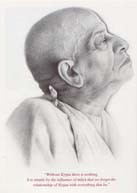
SRILA PRABHUPADA'S QUOTE OF THE DAY
Srila Prabhupada's letter:
...
Although there may be some difficulties within our Society, these things
are not very important. What is important is that we should simply fix
our mind on Krishna's Lotus Feet. This is His instruction in the Bhagavad
Gita. So we associate with one-another so that we can assist each other
in hearing and chanting about Krishna. That is the purpose of our Society.
This you will not find in the materialistic society where all hearing and
chanting is simply concerned with sense gratification. So our desire is
Krishna and we want to go back home-- Back to Godhead where Krishna lives
eternally. So you simply follow my instructions as I have given to you
and surely your life will be a success.
...
Letter to: Nrhari Bombay 22 November, 1974
Sign-up to receive these quote HERE:
mailto:haribol@pacific.net.sg

Bhaktivedanta Vedabase Network ...
http://vedabase.net/


The Scientific - Mathematical
Proof for God's existence:
http://geocities.com/sector114

http://robot-hosting.com/php/login_nicholas.html
user name = guest
password = guest
(Collection of philosophical and mathematical proofs
for existence of God can be found in this site.)

Scientifically Philosophical Books for the layman
 ...
... ...
...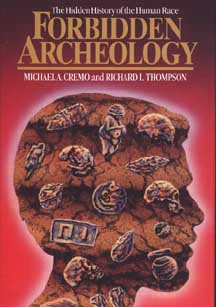 ...
...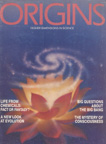
Click on any of these books to read more about them and where to get
a copy
or contact your local temple for purchases
sample of Life
comes from Life HERE.pdf

Lotus Imprints - Preserving Prabhupada's Legacy - The
Publishing House of Hari Sauri dasa
http://www.lotusimprints.com/

Quotes from Shastra - scriptures
View using Balaram font
 SaphalA
EkAdasii
SaphalA
EkAdasii
Yudhisthira Maharaj said, “O my Dear Lord Sri Krishna, what
is the name of that Ekadasi that occurs during the dark fortnight of the
month of Pausha (December-January)? How is it observed, and which Deity
is to be worshipped on that sacred day? Please narrate these details to
me fully, so that I may understand Oh Janardana.”
The Supreme Personality of Godhead Sri Krishna then replied,
“O best of kings, because you desire to hear, I shall fully describe to
you the glories of the Pausha-krshna Ekadasi.
“I do not become as pleased by sacrifice or charity
as I do by My devotees observance of a full fast on Ekadasi. To the best
of one’s ability, therefore, one should fast on Ekadasi, the day of Lord
Hari.
“O Yudhisthira, I urge you to hear with undivided
intelligence the glories of Pausha-krshna Ekadasi, which falls on a Dwadasi.
As I explained previously, one should not differentiate among the many
Ekadasis. O king, to benefit humanity at large I shall now describe to
you the process of observing Pausha-krshna Ekadasi.
“Pausha-krshna Ekadasi is also known as Saphalaa
Ekadasi. On this sacred day one should worship Lord Narayana, for He is
its ruling Deity. One should do so by follow the previously described method
of fasting. Just as among snakes Shesha-naga is the best, and among birds
Garuda is the best, among sacrifices the Ashvamedha-yajna is the best,
among rivers Mother Ganges is the best, among gods Lord Vishnu is best,
and among two-legged beings the brahmins are the best, so among all fasting
days Ekadasi is by far the best. O foremost of kings who took your birth
in the Bharata dynasty, whoever strictly observes Ekadasi becomes very
dear to Me and indeed worshippable by Me in every way. Now please listen
as I describe the process for observing Saphalaa Ekadasi.
“On Saphalaa Ekadasi My devotee should worship Me by offering
Me fresh fruits according to time, place and circumstance, and by meditating
on Me as the all-auspicious Supreme Personality. He should offer Me jaambira
fruit, pomegranate, betal nuts and leaves, coconut, guava, varieties of
nuts, cloves, mangoes, and different kinds of aromatic spices. He should
also offer Me incense and bright ghee lamps, for such an offering of lamps
on Saphalaa Ekadasi is especially glorious. The devotee should try to stay
awake all the Ekadasi night.
“Now please hear with undivided attention as I tell you
how much merit one gets if he fasts and remains awake throughout the entire
night singing and chanting the glories of Narayana. O best of kings, there
is no sacrifice or pilgrimage that yields merit that is equal to or better
than the merit one gains by fasting on this Saphalaa Ekadasi. Such fasting
– particularly if one can remain awake and alert the entire night long
– bestows the same merit upon the faithful devotee as the performance of
austerity for five thousand earthly years. O lion among kings, please hear
from Me the glorious history that made this Divine Ekadasi famous.
“Once there was a City called Champaavati, which was
ruled by the saintly King Maahishmata. He had four sons, the eldest of
whom, Lumpaka, always engaged in all manner of very sinful activities –
illicit sexual encounters with the wives of others, gambling, and continual
association with known prostitutes. His evil deeds gradually reduced the
wealth of his father, King Maahishmata. Lumpaka also became very critical
of the numerous devas, the empowered universal attendants of the Lord,
as well as toward the brahmins, and every day he would go out of his way
to blaspheme the Vaishnavas. At last King Maahishmata, seeing the unrepentant
brazen fallen condition of his son, exiled him to the forest. Out of fear
of the king, even compassionate relatives didn’t come to Lumpaka’s defense,
so angry was the king toward his son, and so sinful was this Lumpaka.
“Bewildered in his exile, the fallen and rejected Lumpaka
thought to himself, ‘My father has sent me away, and even my kinsmen do
not raise but a finger in objection. What am I to do now?’ He schemed sinfully
and thought, ‘I shall sneak back to the city under cover of darkness and
plunder its wealth. During the day I shall stay in the forest, and as night
returns, so shall I to the city.’ So thinking, the sinful Lumpaka
entered the darkness of the forest. He killed many animals by day, and
by night he stole all manner of valuable items from the city. The city-dwelling
folk apprehended him several times, but out of fear of the king they left
him alone. They thought to themselves that it must have been the accumulated
sins of Lumpaka’s previous births that had forced him to act in such a
way that he lost his royal facilities and became to act so sinfully like
a common selfish thief.
“Though a meat-eater, Lumpaka would also eat fruits every
day. He resided under an old banyan tree that unknown to him happened to
be very dear to Lord Vaasudeva. Indeed, many worshipped as the demi-god
(representative departmental head) of all the trees in the forest. In due
course of time, while Lumpaka was doing so many sinful and condemnable
activities, the Saphalaa Ekadasi arrived. On the eve of the Ekadasi (Dasami)
Lumpaka had to pass the entire night without sleep because of severe cold
that he felt due to his scanty bedclothes (bedding). The cold not only
robbed him of all peace but almost of his very life. By the time the sun
rose, near dead, his teeth chattering and near comatose. In fact all that
Ekadasi morning, he remained in that stupour and could not awaken out of
his near comatose condition.
“When midday of the Saphalaa Ekadasi arrived, the sinful
Lumpaka finally came to and managed to rise up from his place under that
banyan tree. But with every step he took, he stumbled and fell to the ground.
Like a lame man, he walked slowly and hesitantly, suffering greatly from
hunger and thirst in the midst of the jungle. So weak was Lumpaka that
he couldn’t even concentrate to nor muster strength to go and kill even
a single animal that whole day. Instead, he was reduced to collecting whatever
fruits had fallen to the ground of their own accord. By the time he returned
to his banyan tree home, the sun had set.
“Placing the fruits on the ground next to him (at the
base of the sacred banyan tree), Lumpaka began to cry out, ‘O, woe is me
! What should I do ? Dear father, what is to become of me? O Sri Hari,
please be merciful to me and accept these fruits as an offering !’
Again he was forced to lie awake the whole night without sleep, but in
the meantime the all merciful Supreme Personality of Godhead, Lord Madhusudana,
had become pleased with Lumpaka’s humble offering of forest fruits, and
He accepted them. Lumpaka had unwittingly observed a full Ekadasi fast,
and by the merit he reaped on that day he regained his kingdom with no
further obstacles.
“Listen, O Yudhisthira, to what happened to the son of
King Maahishmata when but a fragment of the merit spouted up within his
heart.
“As the Sun beautifully rose in the sky on the day following
Ekadasi, a handsome horse approached Lumpaka as if seeking him out, and
stood next to him. At the same time, a voice suddenly boomed out from the
clear blue sky saying, ‘This horse is for you, Lumpaka! Mount it and ride
swiftly out of this forest to greet your family! O son of King Maahishmata,
by the mercy of the Supreme lord Vaasudeva and the strength of the merit
you acquired by observing Saphalaa Ekadasi, your kingdom will be returned
to you without any further hindrances. Such is the benefit you have gained
by fasting on this most auspicious of days. Go now, to your father and
enjoy your rightful place in the dynasty.’
“Upon hearing these celestial words resounding from above,
Lumpaka mounted the horse and rode back to the city of Champaavati. By
the merit he had accrued by fasting on Saphalaa Ekadasi, he had become
a handsome prince once more and was able to absorb his mind in the lotus
feet of the Supreme Personality of Godhead, Hari. In other words, he had
become My pure devotee.
“Lumpaka offered his father, King Maahishmata, his humble
obeisances and once more accepted his princely responsibilities. Seeing
his son so decorated with Vaishnava ornaments and tilak (udhvara pundra)
King Maahishmata gave him the kingdom, and Lumpaka ruled unopposed for
many, many years. Whenever the Ekadasi came, he worshipped the Supreme
Lord Narayana with great devotion. And by the mercy of Sri Krishna he obtained
a beautiful wife and a fine son. In old age Lumpaka handed his kingdom
over to his son – just as his own father, King Maahishmata, had handed
it over to him. Lumpaka then went to the forest to dedicate his concentrate
attention to gratefully serve the Supreme Lord with controlled mind and
senses. Purified of all material desires, he left his old material body
and returned back to home, back to Godhead, attaining a place near the
lotus feet of his worshipful Lord, Sri Krishna.
“O Yudhisthira, one who approaches Me as Lumpaka
did will become completely free of lamentation and anxiety. Indeed, anyone
who properly observes this glorious Saphalaa Ekadasi – even unknowingly,
like Lumpaka – will become famous in this world. He will become perfectly
liberated at death and return to the spiritual abode of Vaikuntha. Of this
there is no doubt. Moreover, one who simply hears the glories of Saphalaa
Ekadasi obtains the same merit derived by one who performs a Rajasurya-yajna,
and at the very least he goes to heaven in his next birth, so where is
the loss?”
Thus ends the narration of the glories of Pausha-krshna Ekadasi,
or Saphalaa Ekadasi, from the Bhavishya-uttara Purana.
These stories have been summarised and slightly changed, abbreviated
or added to from how they are found in the celebrated book, "Ekadasi: The
Day of Lord Hari" 1986. HH Krishna Balaram Swami. Bhaktivedanta Institute
Press.
This particular Ekadasi is found on pages 29-32.

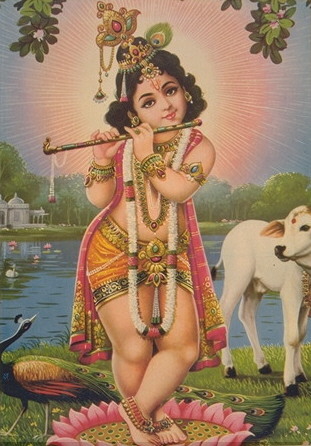

PutradA EkAdasii
Putradaa Ekaadasii - Pausha-shukla Ekaadasii:
The pious and saintly Yudhisthira Maharaj said, “Oh Lord,
You have so nicely explained to us the wonderful glories of the Saphalaa
Ekaadasi, which occurs during the dark fortnight (Krishna paksha)
of the month of Pausha (December – January). Now please be merciful to
me and explain to me the details of the Ekaadasi that occurs in the light
fortnight (Shukla or Gaura paksha) of this month. What is its name, and
what Deity is to be worshipped on that sacred day? Oh Purushottama, Oh
Hrishikesha, please also tell me how You can be pleased on this day?
Lord Sri Krishna then replied, “Oh saintly king, for the
benefit of all humanity I shall now tell you how to observe fasting on
the Pausha-shukla Ekaadasi.
As previously explained, everyone should observe
the rules and regulations of the Ekaadasi vrata, to the very best of their
ability. This injunction also applies to the Ekaadasi named Putradaa, which
destroys all sins and elevates one to the spiritual abode. The Supreme
Personality of Godhead Shri Narayana, the original personality, is the
worshippable Deity of the Ekaadasi, and for His faithful devotees He happily
fulfills all desires and awards full perfection. Thus among all the animate
and inanimate beings in the three worlds (lower, middle and higher planetary
systems), there is no better personality than Lord Narayana.
“Oh King, now I shall narrate to you the history
of Putradaa Ekaadasi, which removes all kinds of sins and makes one famous
and learned.
“There was once a kingdom named Bhadraavati, which
was ruled by King Suketumaan. His queen was the famous Shaibyaa. Because
he had no son, he spent a long time in anxiety, thinking, ‘If I have no
son, who will carry on my dynasty?’ In this way the king meditated in a
religious attitude for a very long time, thinking, ‘Where should I go?
What should I do? How can I get a pious son (putra)?
In this way King Suketumaan could find no happiness anywhere in his kingdom,
even in his own palace, and soon he was spending more and more time inside
his wife’s palace, gloomily thinking only of how he could get a son.
“Thus both King Suketumaan and Queen Shaibyaa were
in great distress. Even when they offered tarpana (oblations of water to
their forefathers), their mutual misery made them think that it was as
undrinkable as boiling water. They thus thought that they would have no
descendants to offer tarpana to them when they died and thus become lost
souls (ghosts). The king and queen were especially
upset to learn that their forefathers were worried that soon there would
be no one to offer them tarpana also.
“After learning of their forefathers unhappiness,
the king and queen became more and more miserable, and neither ministers,
nor friends, nor even loved ones could cheer them up. To the king, his
elephants and horses and infantry were no solace, and at last he became
practically inert and helpless.
“The king thought to himself, ‘It is said that without
a son, marriage is wasted. Indeed, for a family man with no son, both his
heart and his splendid house remain vacant and miserable. Bereft of a son,
a man cannot liquidate the debts that he owes his forefathers, the demigods
(devas) and to other human beings. Therefore every married man should endeavour
to beget a son; thus he will become famous within this world and at last
attain the auspicious celestial realms. A son is proof of the pious activities
a man performed in his past one hundred lifetimes, and such a person achieve
a long duration of life in this world, along with good health and great
wealth. Possessing sons and grandsons in this lifetime proves that one
has worshipped Lord Vishnu, the Supreme Personality of Godhead, in the
past. The great blessing of sons, wealth, and sharp intelligence can be
achieved only by worshipping the Supreme Lord, Shri Krishna. That is my
opinion.’
“Thinking thus, the king had no peace. He remained
in anxiety day and night, from morning to evening, and from the time he
lay down to sleep at night until the sun rose in the morning, his dreams
were equally full of great anxiety. Suffering such constant anxiety and
apprehension, King Suketumaan decided to end his misery by committing suicide.
But he realized that suicide throws a person into hellish conditions of
rebirth, and so he abandoned that idea. Seeing that he was gradually destroying
himself by his all consuming anxiety over the lack of a son, the king at
last mounted his horse and left for the dense forest alone. No one, not
even the priests and brahmins of the palace, knew where he had gone.
“In that forest, which was filled with deer and
birds and other animals, King Suketumaan wandered aimlessly, noting all
the different kinds of trees and shrubs, such as the fig, bel fruit, date
palm, jackfruit, bakula, saptaparnaa, tinduka, and tilaka, as well as the
shala, taala, tamaala, saralaa, hingotaa, arjuna, labheraa, bahedaa, sallaki,
karondaa, patala, khaira, shaka, and palaasha trees. All were beautifully
decorated with fruits and flowers. He saw deer, tigers, wild boar, lions,
monkeys, snakes, huge bull elephants in a rut, cow elephants with their
calves, and four tusked elephants with their mates close by. There were
cows, jackals, rabbits, leopards, and hippopotamuses. Beholding all these
animals accompanied by their mates and offspring, the king remembered his
own menagerie, especially his palace elephants, and became so sad that
he absentmindedly wandered into their very midst.
“Suddenly the king heard a jackal howl in the distance.
Startled, he began wandering about, looking around in all directions. Soon
it was midday, and the king started to tire. He was tormented by hunger
and thirst also. He thought, ‘What sinful deed could possibly have done
so that I am now forced to suffer like this, with my throat parched and
burning, and my stomach empty and rumbling? I have pleased the devas (demigods)
with numerous fire sacrifices and abundant devotional worship. I have given
many gifts and delicious sweets in charity to all the worthy brahmins
too. And I have taken care of my subjects as though they were my very own
children. Why then am I suffering so? What unknown sins have come to bear
fruit and torment me in this dreadful way?’
“Absorbed in these thoughts, King Suketumaan struggled
forward, and eventually, due to his pious credits, he came upon a beautiful
lotus bearing pond that resembled the famous Lake Maanasarova. It was filled
with aquatics, including crocodiles and many varieties of fish, and graced
with varieties of lilies and lotuses. The beautiful lotuses had opened
to the Sun, and swans, cranes and ducks swam happily in its waters. Nearby
were many attractive ashramas, where there resided many saints and sages
who could fulfill the desires of anyone. Indeed, they wished everyone well.
When the king saw all this, his right arm and right eye began to quiver,
a sakuna sign (for a male) that something auspicious was about to happen.
“As the king dismounted his horse and stood before
the sages, who sat on the shore of the pond, he saw that they were chanting
the holy names of God on japa beads. The king paid his obeisances and,
joining his palms, addressed them with glorified praises. Observing the
respect the king offered them, the sages said, ‘We are very pleased with
you, Oh king. Kindly tell us why you have come here. What is on your mind?
Please inform us what is your heart’s desire.’
“The king replied, ‘Oh great sages, who are you?
What are your names, surely your presence reveals that you are auspicious
saints? Why have you come to this beautiful place? Please tell me everything.’
“The sages replied, ‘Oh king, we are known as the
ten Vishvadevas (the sons of Vishva; Vasu, Satya, Kratu, Daksha, Kaala,
Kaama, Dhriti, Pururavaa, Maadrava, and Kuru). We have come here to this
very lovely pond to bathe. The month of Magha (Madhava mase) will soon
be here in five days (from the Magh nakshatra), and today is the famous
Putradaa Ekaadasii. One who desires a son should strictly observe this
particular Ekaadasii.’
“The king said, ‘I have tried so hard to have a
son. If you great sages are pleased with me, kindly grant the boon of having
a good son (putra).’
“ ‘The very meaning of Putradaa,’ the sages replied,
‘…is “giver of a putra, pious son.” So please observe a complete fast on
this Ekaadasii day. If you do so, then by our blessing – and by the mercy
of Lord Sri Keshava invested in us – surely you will obtain a son.’
“On the advice of the Vishvadevas, the king observed
the auspicious fast day of Putradaa Ekaadasii according to the established
rules and regulations, and on the Dvaadasii, after breaking his fast, he
paid obeisances again and again to all of them.
“Soon after Suketumaan returned to his palace and
united with his queen. Queen Shaibya immediately became pregnant, and exactly
as the Vishvadevas had predicted, a bright faced, beautiful son was born
to them. In due course of time he became famous as an heroic prince, and
the king gladly pleased his noble son by making him his successor. The
son of Suketumaan took care of his subjects very conscientiously, just
as if they were his own children.
“In conclusion, Oh Yudhisthira, one who wises to
fulfill his desires should strictly observe Putradaa Ekaadasii. While on
this planet, one who strictly observes this Ekaadasii will surely obtain
a son, and after death he will achieve liberation. Anyone who even reads
or hears the glories of Putradaa Ekaadasii obtains the merit earned by
performing an horse sacrifice. It is to benefit all humanity that I have
explained all this to you.”
Thus ends the narration of the glories of Pausha-shukla Ekaadasii,
or Putradaa Ekaadasii, from the Bhavishya Purana of Veda Vyaasadeva.
These stories have been summarized and slightly changed, abbreviated
or added to from how they are found in the celebrated book, "Ekadasi: The
Day of Lord Hari" 1986. HH Krishna Balaram Swami. Bhaktivedanta Institute
Press.
This particular Ekaadasii is to be found between Pages 33-38.
 Sat-TilA
EkAdasii
Sat-TilA
EkAdasii
Sat-tilaa Ekaadasi:
Sri Daalbhya Rishi said to Palastya Muni, "When the spirit soul comes
in contact with the material energy, he immediately begins to perform sinful
activities, such as stealing, killing, and illicit sex. He may even perform
many other terrible deeds, such as killing a brahmin. Oh purest of personalities,
please tell me how these unfortunate souls may escape the punishment of
being sent to hellish regions of creation. Kindly inform me how, by giving
even a little in charity, one may be easily released from the reactions
of his sins."
Pulastya Muni replied, "Oh fortunate one, you have asked me an important
and confidential question, which not even Brahmaa, Vishnu, Shiva or Indra
has ever asked. Please listen very carefully to my answer.
"With the arrival of the month of Magh (January
- February), one should bathe, carefully control his senses by giving up
lust, anger, pride, jealousy, faultfinding, and greed, and meditate on
the Supreme Personality of Godhead Lord Sri Krishna. One should then gather
up some cow dung before it touches the ground and, after mixing it with
sesame seeds and cotton, form 108 balls. This should be done on the day
when the constellation of Purva-ashadha
nakshatra arrives. then one should follow the rules and regulations
of Sri Ekaadasii, which I shall now explain to you.
"After bathing, the person who intends to observe
Ekaadasii should worship the Supreme Lord. While praying to Lord Sri Krishna
by chanting His holy name, he should promise
to observe the Ekaadasii fast. He should remain awake overnight and perform
a homa (fire sacrifice). Then the devotee should perform an Arati
ceremony for the pleasure of the Lord - Who holds a conch, disk, club,
and so on in His hands - offering Him sandalwood paste to his feet, incense,
camphor, a bright ghee lamp, and delicious food preparations. Next the
devotee should offer the 108 balls of cow dung, sesame seeds, and cotton
wool into the sacred fire whilst chanting such holy names of the Lord as
Purusha sukta, and other names. Throughout the whole day and night he should
also observe the standard Ekaadasii vrata (fast, which in this case is
a fast from all kinds of grains and beans). On this occasion one should
offer the Lord pumpkin, coconut, and guava. If these items are unavailable,
betel nut may be substituted.
"The devotee should pray to Lord Sri Janardana,
the benefactor of all living beings, in this way; 'Oh Lord Sri Krishna,
You are the most merciful Personality of Godhead and the giver of liberation
to all fallen souls. Oh Lord, we have fallen into the ocean of material
existence. Please be kind to us. Oh lotus-eyed divinity, please accept
our most humble, affectionate and respectful obeisances. Oh protector of
the entire world, we offer You our humble respects again and again. Oh
Supreme Spirit, Oh Supreme One, Oh source of all our forefathers, may You
and Your eternal consort, Srimati Laxmi-devi,
please accept these humble offerings.'
"The devotee should then try to please a qualified
brahmin with a warm welcome, a pot full of water (purna kumbha), an umbrella,
a pair of shoes, and clothes (cloth - dhoti, and anga vaastra), requesting
him at the same time to bestow his blessings, by which one may develop
unalloyed love for Lord Sri Krishna. According to one's ability, one may
also donate a black cow to such a brahmin, particularly to one who is very
well versed in all the injunctions of the Vedic scriptures. One should
also offer him a pot full of sesame seeds.
"Oh exalted Daalbhya Muni, black sesame seeds
are especially suitable for formal worship and fire sacrifices while white
or brown ones are meant to be eaten by a qualified brahmin. One who can
arrange to give both kinds of sesame seeds (black and white or brown) especially
on this Sat-tilaa Ekaadasii day will be promoted to at least the heavenly
planets after leaving this present body, for as many thousands of years
as the number of seeds that would be produced if the seeds he donated were
sown in the ground and grew into mature, seed bearing plants.
"On this Ekaadasii a faithful person should (1)
bathe in the water mixed with sesame seeds, (2) rub sesame seed paste on
his body, (3) offer sesame seeds into the fire in sacrifice, (4) eat sesame
seeds, (5) give sesame seeds away in charity, (6) accept charitable gifts
of sesame seeds. These are the six (sat) ways in which sesame seeds (tilaa)
are utilised for spiritual purification on this Ekaadasii. Therefore it
is called Sat-tilaa Ekaadasii.
"The great Devarishi Naarad Muni once asked the
Supreme Personality of Godhead, Sri Krishna, 'Oh mighty armed Lord, Oh
You who are so affectionate to Your loving devotees, please accept my most
humble obeisances. Oh Yaadava, kindly tell me the result one obtains by
observing Sat-tilaa Ekaadasii.'
"Lord Sri Krishna replied, 'Oh best of the twice
born brahmins, I shall narrate to you an account of an incident I personally
witnessed. Long ago on earth there lived an old female brahmini who worshipped
Me every day with controlled senses. She very faithfully observed many
a fast, especially on special days honouring Me (My various appearance
days Janmaasthami, Rama-navami,
Vaman
Dwadasi, Nrisimha Chaturdasi, Varaha
Dwadasi, Gaura Purnima, etc. - Calendar)
and served Me with full devotion, devoid of any personal motive. Her rigorous
fasting made her quite weak and thin. She gave charity to brahmanas and
to young maidens (kanyas), and even planned to give away her house in charity.
Oh best of the brahmanas although this spiritually minded woman gave charitable
donations to worthy people, the odd feature of her austerity was that she
never gave food to brahmanas or the devas (demigods).
"'I began to reflect on this curious omission:
"This fine woman has purified herself by fasting on all the auspicious
occasions and by offering Me strict devotional worship. Therefore
she certainly has become eligible to enter My personal abode, which is
unattainable by ordinary persons." So I came down to this planet
to examine her, disguising Myself as a follower of Lord Shiva's, complete
with a garland of skulls draped around My neck and a begging pot (kumandalu)
in My hand.
"'As I approached her, she said toMe, "Oh respectful
one, tell me truthfully why You have come before me."
"'I replied, "Oh beautiful one, I have come to get
some sacred alms from you" - whereupon she angrily threw a dense lump of
mud into My begging pot! Oh Naarada Muni I simply turned around and
went back to My personal abode, astonished at this fine brahmani's peculiar
mixture of great magnanimity and stinginess.
"'At last this austere lady reached the spiritual
world in her self-same body, so great were her efforts at fasting and charity.
And because she had indeed offered Me a lump of mud, I transformed that
mud into a beautiful home. However, Oh Naradaji, this particular
house was just like that mud completely devoid of any edible grains, as
well as any furniture or ornamentation, and when she entered it she found
only an empty structure. She therefore approached Me and said with
great anger, "I have fasted repeatedly on so many auspicious occasions,
making my body weak and thin. I have worshipped You and prayed to
You in so many different ways for You are truly the master and protector
of all the universes. Yet despite all this there is no food or wealth
to be seen in my new home, Oh Janardana, please tell me. Why is this?"
"'I replied, "Please return to your house.
Sometime later the wives of the devas (demigods) will pay you a visit out
of curiosity to see the new arrival, but do not open your door until they
have described to you the glories and importance of Sat-tilaa Ekaadasii."
"'Hearing this, she returned to her house.
Eventually the devas' wives arrived there and in unison said, "Oh beautiful
one, we have come to have your darshan. Oh auspicious one, please
open the doorto your house and let us see you.
"'The lady replied, "Oh most dear ones, if you want
me to open this door, you will have to describe to me the merit one obtains
by observing the sacred fast of Sat-tilaa Ekaadasii." But to this
request, not even one of the wives responded.
"'Later, however, they returned to the house, and
one of the wives nicely explained the sublime nature of this sacred Ekaadasii.
And when the lady at last opened her door, they saw that she was neither
a demigoddess, a Gandharvi, a she-demon, nor even a Naga-patni. She
was simply an ordinary human lady.
"'From then on the lady observed Sat-tilaa Ekaadasii,
which awards ALL material enjoyment and liberation at the same time, as
it has been described to her. And she finally received the beautiful
furnishings and grains she had expected for her home. Moreover, her
once ordinary material body was transformed into a beautiful spiritual
form made of sac-cid-ananda (eternality, knowledge,and bliss), with a fine
complexion. So, by the mercy and grace of Sat-tilaa Ekaadasii, both
the lady and her new home in the spiritual world were at last radiantly
splendid and lustrous with gold, silver, jewels, and diamonds.
"'Oh Naradaji, a person should not ostentatiously
observe Ekaadasii out of greed, with the hope of attaining wealth dishonestly.
Selflessly, he should simply donate sesame seed, clothes, and food according
to his capacity, for by doing so he will achieve good health and exalted
spiritual consciousness, birth after birth. Ultimately, he will begiven
release from the bonds of this world (liberation) and admittance into the
Lord's supreme abode will be his to enjoy. That is my opinion, Oh
best of the demigods deva-rishis).'
"Oh Daalbhya Muni," Pulastya Rishi concluded, "one
who properly observes this wonderful Sat-tilaa Ekaadasii with great faith
become free from all kinds of poverty - spiritual, mental, physical, social,
and intellectual - as well as all kinds of ill luck and evil omens (sakuna).
Indeed, following this Ekaadasii fast by donating, sacrificing, or eating
sesame seeds frees one of all past sin, without a doubt. One need not wonder
how this happens. The rare soul who properly performs these acts
of charity in the right devotional mood, following the Vedic injunctions,
will become utterly free of all sinful reactions and go back to Godhead,
back home to the spiritual world."
Thus ends the narration of the glories of Magh-krishna
Ekaadasii, or Sat-tilaa Ekaadasii,
from the sacred Bhavishya-uttara Purana of Srila Krishna Dwaipayana
Vyaasa.
These stories have been summarised and slightly changed or abbreviated
from how they are found in the celebrated book, "Ekadasi: The Day of Lord
Hari" 1986. HH Krishna Balaram Swami. Bhaktivedanta Institute Press. pages
39-44.
Choose The Month (Vaishnava or Western), Paksha
or Ekadasi

Xmas Madness
Here we are taking a non-sentimental look at "the festive
season" where in the name of religiosity millions of innocent animals are
slaughtered; where alcoholism and drugs are used by millions in "celebration";
where mindless frivolity, gambling and other time wasting activities are
rife; and where numerous unwanted by-products of loose sexual encounters
take their conception, to burden society, and add to the social bill the
rest of us carry.
Accordingly we must understand what the authorised
scripture calls the modes of nature that such "festivities" come under.
Factually what value these festivals hold to benefit human society in any
way, if any. Also whose "culture" they belong
to... (here we use this word culture in its loosest possible meaning).
Ancient solstice meaning
Christmas, ironically, antedates the Nativity of Christ,
and December 25th is a fudge. In the third century A.D. the Church fathers
chose that day as Christ’s birthday, with good reason. It happens to fall
approximately on the Northern Hemisphere’s Winter Solstice, and December
25th (Midwinter’s Day) which has been from time immemorial a day sacred
to the rebirth of the light of the sun in the depths of winter.
This day was the Festival of Natalis Sol Invictus
(the Birth of the Undefeated Sun) in ancient Rome. Ancient peoples of the
region also commemorated the Babylonian Queen of Heaven, Osiris in Egypt,
Dionysus, Helios, Adonis, the Celtic Cernunnos, the Syrian Baal, Attis,
Mithras, Balder and the Norse goddess Frey - all celebrated on the ancient
Winter Solstice, and mostly solar saviours and dying gods. Most of these
deities were given similar titles: the Light of the World, Sun of Righteousness,
and Saviour. Among these huge celebrations the optimists within the newly
founded Christian Church decided to cash in on the festivities and usurp
them for their own end in swinging their influence toward the celebration
of Jesus the Christ's birth.
As you can testify, it was a great success for them,
so much so that through their zealousness the original events were eclipsed
into near oblivion - who of us learned about them at school, or in our
religious instruction? No they were purposefully hidden, as has so much
been over the past several hundred years by missionaries obviously so inferior
that they had to erase all other cultures world wide to have their new
cult of Christianity stand alone as "the one true way".
By the way did you know that Santa Claus used to wear
green until some advertising materialist decided to change the color scheme
on behalf of Coca Cola in the 1930’s? Commercialism at its "best".............
The original nature of the event that has become known
as XMAS has been further brought out in the following Xmas
pages that reveal how it has degenerated. Get
an in-depth view of the origin of Xmas and it's present form at this other
Xmas page HERE
All the details of Christmas from different cultures around
the world have been compiled by Pip Wilson in his Almanac HERE
 The
Pope begs for forgiveness for sins that the Church has done against other
cultures and religions:
The
Pope begs for forgiveness for sins that the Church has done against other
cultures and religions:
 St
Nick - Santa Claus page
St
Nick - Santa Claus page
Christmas Catching On in India
Source: http://www.hinduism-today.com/1995/11/1995-11-14.html
NEW DELHI, INDIA, December 24, 2002: A recent New York Times article
describes Hindus in India taking to the Christian holiday of Christmas.
While devout Hindus never start their day without lighting at least an
incense stick and offering prayers to their chosen Hindu deity, come December
many begin planning for Christmas. "It doesn't matter if I'm a Hindu. Christmas
stands for love, affection, sharing, renewing family bonds. It's a festival
for everyone," said one of the Hindus interviewed, as she shopped for tree
decorations at New Delhi's upscale Ansal Plaza mall. Not surprisingly are
the many echoes of complaints heard in the West about Christmas becoming
commercialized. The popularity of Christmas does not extend to the religious
themes associated with the festival. It's only Christians who attend midnight
church services on Christmas Eve and nativity scenes can be seen only in
Christian institutions and churches. For a Hindu perspective during this
season of worldwide celebrations, see "source" above for a description
of Pancha Ganapati, a modern festival or "Hindu Christmas," that is a time
of gift giving and home religious observances honoring a family's love
and togetherness, community harmony and cultural celebrations.
This article was by courtesy of http://www.HinduismToday.com/
 Little-Known Stories
Show Christmas Has Some Contentious - and Pagan - Origins - From
the Religion News Service
Little-Known Stories
Show Christmas Has Some Contentious - and Pagan - Origins - From
the Religion News Service
USA, December 24, 2003: This interesting piece on the origins of Christmas
appeared in the Religion News Service and is written by Yvonne Betowt:
Did you know Alabama was the first state to declare Christmas an official
holiday? That happened in 1836, 71 years before the last state -- Oklahoma
-- followed suit in 1907. Christmas is the only legal national religious
holiday in the United States. While it has been less than 100 years since
all 50 states recognized Christmas as an official holiday, Dec. 25 has
been celebrated for centuries by Christians as Jesus' birthday. But until
245 A.D., when a group of scholars tried to determine the date of Christmas,
the question had never been addressed, according to a 1995 article by Victor
M. Parachin in the Christian Reader. However, the project by the early
church theologians was denounced by a church council, which thought it
wrong to celebrate Jesus' birthday "as though he were a King Pharaoh."
That didn't prevent the scholar-theologians from continuing their quest
to determine the day Jesus was born. They originally listed four dates
-- Jan. 1 and 6, March 25 and May 20 -- as possibilities, according to
Parachin's research.
It wasn't until 349 A.D. that Dec. 25 was formally chosen as Christmas
Day by Pope Julius. The date was already celebrated as the Natalis Solis
Invicti in honor of the sun god, Mithras, by Roman citizens. They decorated
their homes with greenery, exchanged gifts and gathered for festive meals
on that date, observed just after the winter solstice. Many scholars believe
Pope Julius picked Dec. 25 as Christmas Day to convert followers of Mithras,
in addition to providing Christians with an opportunity to celebrate Jesus'
birth. Christmas continued, however, to be a contentious issue.
In 17th century England and early America, English Puritans said the
Bible offered no clear basis for celebrating Jesus' birth. In 1643, the
English Parliament outlawed not only Christmas, but Easter and other Christian
celebrations. But by 1660, Christmas had become such a popular holiday,
the law was repealed. After the Pilgrims arrived at Plymouth, Mass., in
1620, their English misgivings about Christmas celebrations continued.
In 1659, people in Massachusetts who celebrated Christmas were fined. The
law was struck down in 1681 because the popularity of observing Christmas
had grown immensely.
However, Christian groups remained divided over whether Christmas should
be celebrated because of its ties to pagan observances. The Lutherans,
Dutch Reformed, Catholic and Anglican churches forged ahead with the celebrations
while the Baptists, Presbyterians, Quakers and Puritans continued to rail
against it. Even today, some Christian groups, including many Churches
of Christ and Seventh-day Adventists, do not acknowledge Christmas as a
religious observance.
Satguru Sivaya Subramuniyaswami created the modern-day festival of Pancha
Ganapati to coincide with the Christmas celebrations for Hindus living
in the West. It's a means to participate in the festive season without
the trappings of another religion's holiday. Click http://www.hinduismtoday.com/archives/1995/11/1995-11-14.shtml
for the details.
This article is by courtesy of http://www.HinduismToday.com/
(24th December 2003)
 Vegetarians
over the Holiday period - looking after them:
Vegetarians
over the Holiday period - looking after them:
 Xmas
Guide for devotees:
Xmas
Guide for devotees:
 Xmas
- a modern page that completely misses the point all about Christmas:
Xmas
- a modern page that completely misses the point all about Christmas:
 Survival
Guide to the Holiday Season:
Survival
Guide to the Holiday Season:
 THE
HOLIDAY FESTIVAL - talk by HH Giriraj Swami
THE
HOLIDAY FESTIVAL - talk by HH Giriraj Swami
 Teen
Vegetarians at Xmas
Teen
Vegetarians at Xmas
 Recipes
4 Xmas
Recipes
4 Xmas
 International
Vegetarian Union's list of Seasonal dishes - some have eggs, garlic
and onion, many are adaptable:
International
Vegetarian Union's list of Seasonal dishes - some have eggs, garlic
and onion, many are adaptable:
 Vegan
Xmas or Yule - some have onion, garlic, mushrooms too:
Vegan
Xmas or Yule - some have onion, garlic, mushrooms too:
 "Culture
- Brahminical or Animal"
"Culture
- Brahminical or Animal"
 Hanukkah
- the Jewish festival of lights over the Xmas period:
Hanukkah
- the Jewish festival of lights over the Xmas period:
 Ramadan
- the Moslem religious observation, explanation page:
Ramadan
- the Moslem religious observation, explanation page:
 Kwanza
- the African-American cultural hereditary observation:
Kwanza
- the African-American cultural hereditary observation:
 Anti-Xmas
page:
Anti-Xmas
page:
 Online
Christmas Games:
Online
Christmas Games:
 PROOF
FROM THE BIBLE-- CHRIST WAS NOT BORN ON DECEMBER 25TH
PROOF
FROM THE BIBLE-- CHRIST WAS NOT BORN ON DECEMBER 25TH
 A
look at the Western Indologists - their motive and intent:
A
look at the Western Indologists - their motive and intent:
 The
Western Scientific Faculty:
The
Western Scientific Faculty:
 Freud
and his psychosis:
Freud
and his psychosis:
 The
myth of slaughterhouse civilization:
The
myth of slaughterhouse civilization:
 History
& Source of Veda:
History
& Source of Veda:
 Vegetarianism
and Beyond:
Vegetarianism
and Beyond:
 Bhaktivedanta
Science Institute:
Bhaktivedanta
Science Institute:
 Darwin
Pages:
Darwin
Pages:
 VedaBase
- A folio of every recorded word written or spoken by the Founder Acarya
of Iskcon:
VedaBase
- A folio of every recorded word written or spoken by the Founder Acarya
of Iskcon:
 Mayapur
Institute of Higher Education:
Mayapur
Institute of Higher Education:
 Vedik
World Heritage
Vedik
World Heritage
 Index
of Vedik links
Index
of Vedik links

Courtesy of http://www.vedabase.com/
used
with permission









![]()
![]()
![]()
![]()
![]()

![]()
![]()
![]()
![]()

![]()
![]()
![]()
![]()















 SaphalA
EkAdasii
SaphalA
EkAdasii


 Little-Known Stories
Show Christmas Has Some Contentious - and Pagan - Origins - From
the Religion News Service
Little-Known Stories
Show Christmas Has Some Contentious - and Pagan - Origins - From
the Religion News Service

